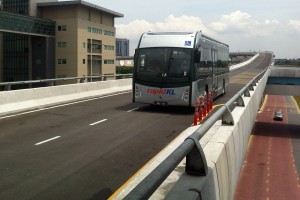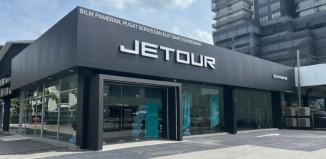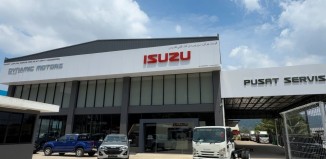Volvo Buses Jointly Hosts Bus Rapid Transit Conference With Technology Depository Agency And Prasarana Malaysia Berhad
Last week, Volvo Buses hosted the inaugural Bus Rapid Transit (BRT) Conference in Putrajaya, along with the Technology Depository Agency (TDA) and Prasarana Malaysia Bhd which operates the urban rail and bus services. A Bus Rapid Transit denotes a bus system that operates similarly to a light rail system with dedicated lanes, off-board fare collection, higher capacity and frequency, and usually with sizable stations or platforms. A current example is the BRT system that services Sunway-Setia Jaya, Bandar Sunway and USJ that runs on an elevated road specifically for the buses to avoid being stuck in heavy traffic.

This conference is part of the commitment by Volvo Buses to Malaysia’s Industrial Collaboration Programme (ICP) which ensures that every Ringgit spent by the government on procurement brings value to the country in the form of technology transfer, human capital development as well as enhancement of local companies’ involvement in the global supply chain. The ICP is the result of a procurement of 90 units of Volvo B8L double deck buses by Prasarana for Rapid Bus. The B8L is a three-axle low-floor double decker that currently sees service in Hong Kong and Singapore.
The Technology Depository Agency is an agency under the Ministry of Finance Malaysia that is responsible for managing, administering and monitoring all ICP activity implementation in Malaysia. The ICP is also supported by the Government of Malaysia, the Swedish Embassy and Business Sweden, an organisation jointly owned by the Government of Sweden and representatives from the Swedish business community.
The ICP brought together the key stakeholders from across Malaysia to build a shared vision and join hands to make Bus Rapid Transit a reality in Malaysia. The conference drew on the experience of BRT specialists, blending global insights with local experience. The aim was to identify and address key considerations in regards to BRT implementation including; planning, tendering, designing, constructing, operating and maintenance.

Attending the conference were over 270 delegates from various agencies and departments; guests of honour; YB Tuan Loke Siew Fook, Transport Minister of the Government of Malaysia; and Swedish Ambassador to Malaysia, H.E. Dag Juhlin-Dannfelt, Embassy of Sweden, both of whom opened the conference with speeches addressing the future of public transport in Malaysia.
The conference agenda also incorporated keynote speeches from various international and local speakers such as:
- Xiaomei Duan, Chief Engineer, Guangzhou Municipal Engineering Design and Research Institute, China
- Yoga Adiwinarto, Director of Engineering and Facility at PT. Transportasi Jakarta (Transjakarta), Indonesia
- Sue Chan, Head of UITP Asia Pacific, Hong Kong
- Frits Olyslagers, Public Transport / Institutional Specialist, Australia
- Muhammad Yazurin Sallij Muhammad Yasin, CEO Rapid Bus, Malaysia
- Stefan Widlund, City Mobility Director, Volvo Bus Corporation, Sweden
Key topics that were presented included:
- An international overview of the BRT concept and its suitability to prospering cities
- Existing business models using examples from across the globe
- Information on choosing the right technology, design, construction and operation
- The value of public transport and implementation of land value capture
- Malaysia’s latest developments in regards to BRT systems

The programme also included a panel discussion on ‘The Future of Bus Rapid Transit in Malaysia’. Moderated by Sridhar Chari, a former public transport journalist from India, who now works in public relations for Volvo Buses, the panel discussion shared, discussed and debated views, experiences, and ideas on future BRT systems in Malaysia.
The panel also discussed various technology choices such as clean Euro 6 diesel, hybrid technologies and electrification. Panelists in the discussion included:
- Muhammad Yazurin Sallij Muhammad Yasin, CEO Rapid Bus, Malaysia
- Xiaomei Duan, Chief Technical Officer, Far East BRT Planning Co. Limited, China
- Ahmad Radhi, Deputy Director General (Development) of APAD, Malaysia
- Jan Vandooren, Director Urban Mobility, Volvo Bus Corporation, Belgium
- Yoga Adiwinarto, Director of Engineering and Facility at PT. Transportasi Jakarta (Transjakarta), Indonesia
 “Volvo Buses are extremely proud to be one of the organising partners behind this event. Volvo has immense experience with BRT and in fact, were the first to invent and deliver the high-capacity BRT system in Curitiba, Brazil in 1975. Since then, we have been actively involved in expanding BRT to all continents and encouraging discussions such as these to further promote the solution. For growing cities, we have seen excellent benefits from BRT systems such as, the reduction of travel time by 50% and increase to air quality and safety due to fewer cars on the road. At Volvo buses, we truly believe BRT to be the most flexible, scalable and cost-efficient transport infrastructure and we look forward to seeing many BRT developments in Malaysia’s future,” says Volvo Buses Senior Vice President, Akash Passey.
“Volvo Buses are extremely proud to be one of the organising partners behind this event. Volvo has immense experience with BRT and in fact, were the first to invent and deliver the high-capacity BRT system in Curitiba, Brazil in 1975. Since then, we have been actively involved in expanding BRT to all continents and encouraging discussions such as these to further promote the solution. For growing cities, we have seen excellent benefits from BRT systems such as, the reduction of travel time by 50% and increase to air quality and safety due to fewer cars on the road. At Volvo buses, we truly believe BRT to be the most flexible, scalable and cost-efficient transport infrastructure and we look forward to seeing many BRT developments in Malaysia’s future,” says Volvo Buses Senior Vice President, Akash Passey.
In closing, the CEO of TDA, Dato’ Zailani Safari summarised the conference and highlighted the importance of ICP as an economic tool to develop and strengthen Malaysia’s economy through procuring technology and knowledge that is both foreign and not available locally.

There is no doubt that a BRT network is an effective public system as seen in several cities (Jakarta and Mexico City are prime examples), and is crucial for Malaysia in addressing rapid urbanisation and congestion. One of the takeaways is that a BRT system should be established with very definite goals and objectives for the infrastructure and management from the start rather than just focusing on the technology part of it (e.g. gas or full-electric). A BRT system must also cater to the masses and be affordable to them, and not just to a select crowd.
 In certain conditions, a hybrid or even a clean diesel BRT system may be more efficient and cost-effective than a fully electric one. This is because battery powered buses still have relatively higher associated costs for maintenance as well as the compromise between passenger load and battery capacity. Perhaps this avenue of clean diesel or hybrid is what Malaysia needs to pursue since we do not have a developed sector to support fully electric vehicles. Then again, it will be interesting to see whether the government will fast-track Malaysia’s fuel quality to the latest Euro 6 standard in support of modern technology that helps reduce emissions (our trucking sector is lagging behind in this regard because of our diesel quality).
In certain conditions, a hybrid or even a clean diesel BRT system may be more efficient and cost-effective than a fully electric one. This is because battery powered buses still have relatively higher associated costs for maintenance as well as the compromise between passenger load and battery capacity. Perhaps this avenue of clean diesel or hybrid is what Malaysia needs to pursue since we do not have a developed sector to support fully electric vehicles. Then again, it will be interesting to see whether the government will fast-track Malaysia’s fuel quality to the latest Euro 6 standard in support of modern technology that helps reduce emissions (our trucking sector is lagging behind in this regard because of our diesel quality).
Further, there is no confirmation yet on where the new double deck buses will be used or when, but we assume Prasarana will provide updates in due course when they take delivery. If they are to be used in Kuala Lumpur, whether a dedicated busway can be fitted into the already narrow and congested city streets will be something to take note of.

























